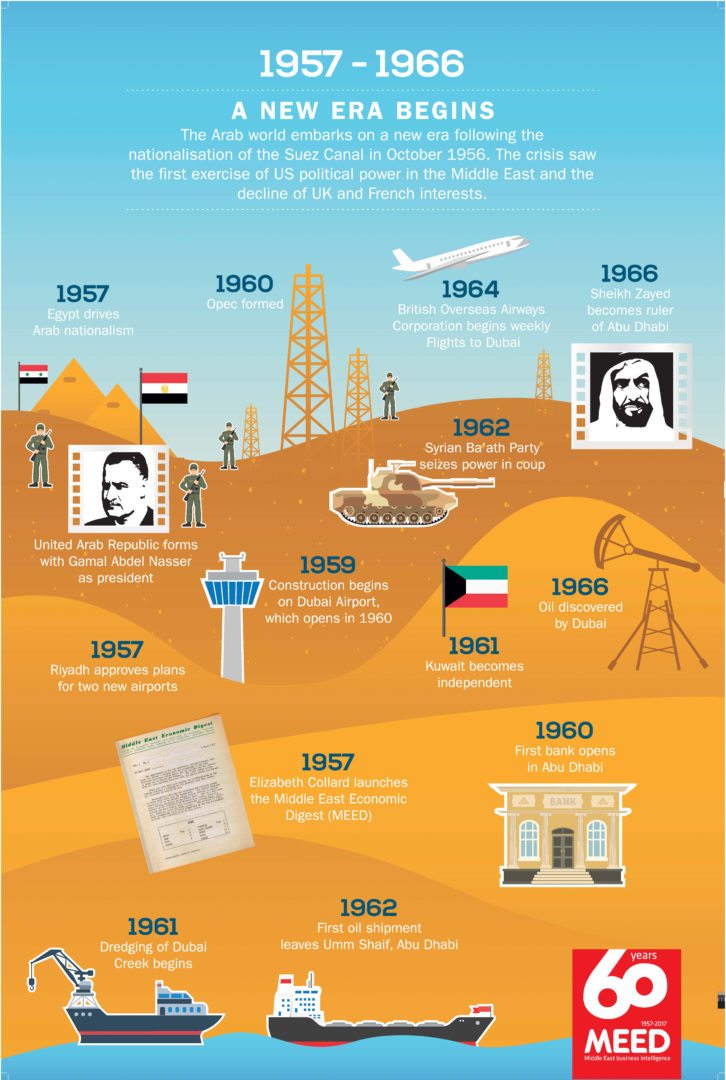

The Arab world embarks on a new era following the nationalisation of the Suez Canal in October 1956. The crisis saw the first exercise of US political power in the Middle East and the decline of UK and French interests

MEED 1957-1966 infographic
MEED 1957-1966 infographic
When MEED launched on International Womens Day in London on 8 March 1957, the Middle East was on the cusp of a new era.
British and French imperial prestige and power had been shattered by the seismic events of the previous year, when Egypts President Gamal Nasser defied the world and nationalised the Suez Canal.
The subsequent invasion of Egyptian territory by British, French and Israeli forces to regain control of the waterway precipitated a crisis that saw the first use of the Arab oil embargo and was ended by the first decisive use of US political power in the region to force Anglo/French troops to withdraw from the canal zone.
The events marked the start of a new phase in Middle East affairs in which the US would be the dominant Western player and oil an instrument of policy. On 5 January 1957, US President Dwight Eisenhower told Congress The Middle East has abruptly reached a new and critical stage in its long and important history.
With US backing, Arab states were being allowed to stand on their own feet for the first time. So impressed was King Saud ibn Abdulaziz of Saudi Arabia that he travelled to Washington and officially adopted the anti-Communist doctrine of Eisenhower. In return for US protection, Riyadh would help keep the oil flowing.
3 Jan 1958
Reports indicate the big oil rush that started in 1956 is beginning to yield results
1 Jan 1965
Yemen is plunged into a state of anarchy after the government resigns
1 Jan 1979
Opec opts for a series of oil price increases staggered through the year
9 Jan 1988
The Saudi governments U-turn on taxing expatriates is likely to provide only temporary relief to the 4 million foreign workers in the kingdom
7 Jan 2000
The Middle East comes a step closer to hosting its first Formula One grand prix race after Dubai is given the go-ahead for construction of a track
Against the backdrop of such seismic events, the first edition of MEED was published by noted economic analyst Elizabeth Collard, who was one of the few to realise the potential the Middle East offered Western firms.
Every Friday evening, friends and relatives would help staple and stuff envelopes with the 12-page MEED newsletter, including Essa Saleh al-Gurg, later to become the UAEs ambassador to the UK, who was then training as a banker in London.
MEED was exactly what it said it was: a compilation of reports flown in weekly from Cairo and Beirut. The first edition included plans to repair oil pipelines in Iraq and the settlement of Turkish debt. Six decades on and MEED is established as the leading source of Middle East business intelligence and the standard of excellence for business reporting on emerging markets.
The Middle East, meanwhile, stands on the cusp of another new era.
You might also like...

Al Ula seeks equestrian village interest
26 April 2024

Morocco seeks firms for 400MW wind schemes
26 April 2024

Countries sign Iraq to Europe road agreement
26 April 2024

Jubail 4 and 6 bidders get more time
26 April 2024
A MEED Subscription...
Subscribe or upgrade your current MEED.com package to support your strategic planning with the MENA region’s best source of business information. Proceed to our online shop below to find out more about the features in each package.








